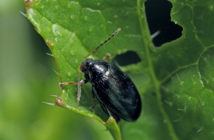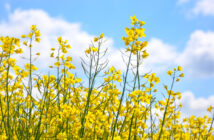Harvest results from two AICC (Association of Independent Crop Consultants) oilseed rape trials sites have demonstrated the value of sound agronomics when it comes to final yield.
Amalie, the TuYV resistant conventional oilseed rape variety, has performed well over expectation this year yielding 108% over control, across 27 varieties in the trials, with yields of 5.3-5.7t/ha.
Winter Oilseed rape Verticillium trials have been located in Suffolk and West Sussex in each of the last three years in order to look at how varieties, both hybrid and conventional, performed over several seasons under standard input regimes, says Peter Cowlrick, an independent agronomist based in Hampshire with CCC Ltd, and also AICC Regional Trials co-ordinator.
Drilled on 24th August 2014, the plots established well, and in what has been a difficult season for many oilseed rape crops it was clear that varieties offering more robust agronomic traits performed better, he says.
“For any variety, the value of any attribute comes down to the final yield result, and this has certainly played out this year when some traits have been fully tested.”
“Going into harvest on the 3rd August, we knew that this would manifest itself in some interesting results.”
With an average yield of 5.5t/ha across the two sites and varieties, it was the Amalie that stood out with its performance – exceeding expectations & right up at the top of the yield rankings he points out.
“Amalie has looked good all through the season and there is no doubt that this is down to its combination of good agronomic traits. The variety not only has the unique TuYV resistance, that has shown itself to be of great value this season, but also has a solid 7 rating for Light Leaf Spot and a 8 rating for Phoma. “
Mr Cowlrick believes that where growers are looking to manage their spend on OSR this season, the TuYV resistance offers a useful saving on the £15-£20/ha that would otherwise need to spent on insecticides, and if more than one spray is needed this could be more.
“Early Verticillium Wilt assessments found that Amalie appeared to have good tolerance, only showing about 15% infection, over and above a number of the other varieties that showed levels of infection as high as 50%.”
Of medium height, Amalie has been described by some growers as a tidy variety to have on farm, as it produces a level canopy and is a dream to combine – and infact this may also contribute to the better yield results – the variety would also fit well in outlying blocks as its TuYV resistance would remove the need to make a separate trip to apply an insecticide.
“Without a doubt, it’s a key variety for this coming year and we are already seeing as much as 30-40% of our farmer’s acreage being drilled to Amalie.”


